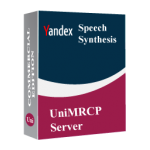Google Cloud
Cloud-based speech recognition and conversational engines provided by Google.

Microsoft Azure
Cloud-based speech recognition and synthesis engines provided by Microsoft.
IBM Watson
Cloud-based speech recognition and synthesis engines provided by IBM.
Amazon Web Services
Cloud-based speech recognition and synthesis engines provided by Amazon.
Yandex Cloud
Cloud-based speech recognition and synthesis engines provided by Yandex.
GoVivace
Speech recognition engines provided by GoVivace.
Misc

Genesys Voice Platform (GVP) is a software-only, standards-based voice portal that provides cost-effective customer interactions for businesses using voice, video, the web, and the cloud.
More

Avaya Aura Experience Portal is the latest generation of Avaya Voice Portal. Experience Portal provides organizations with a single point of orchestration of all automated voice and multimedia applications and services.
More

FreeSWITCH is a scalable open source cross-platform telephony platform designed to route and interconnect popular communication protocols using audio, video, text or any other form of media.
More

Asterisk is an open source framework for building communications applications. Asterisk powers IP PBX systems, VoIP gateways, conference servers and other custom solutions.
More
UniMRCP
UniMRCP is an open source cross-platform implementation of the MRCP client and server in the C/C++ language distributed under the terms of the Apache License 2.0.
More
Asterisk Modules
UniMRCP integration allows Asterisk to facilitate the use of the industry standard media resource servers for implementation of speech applications.
More












